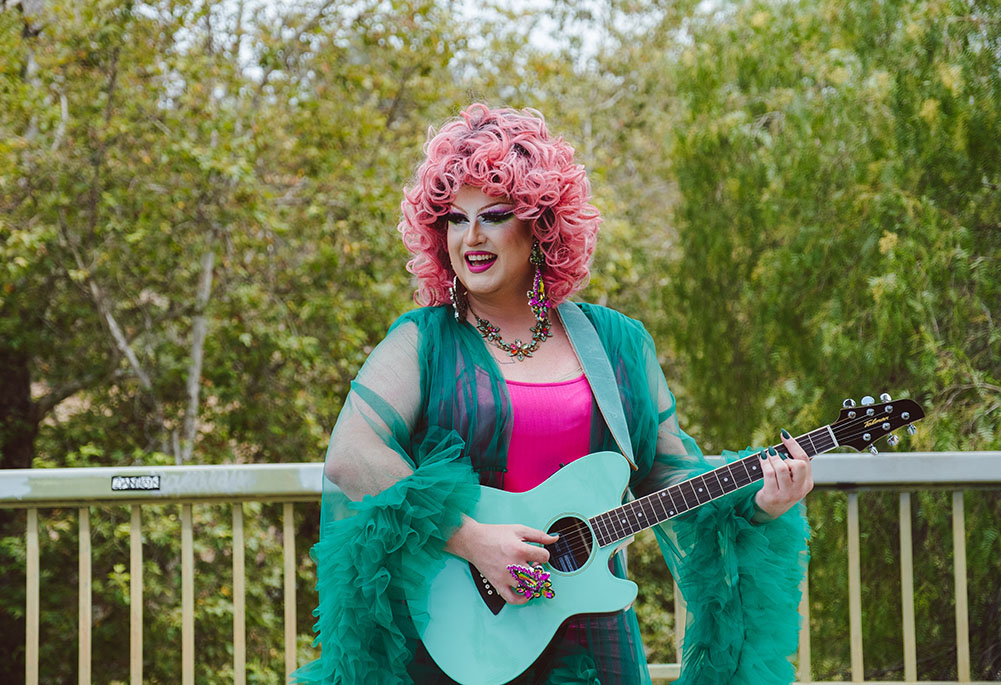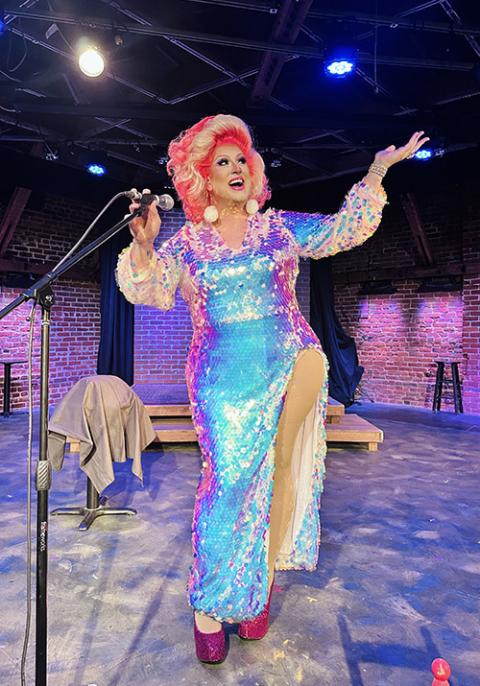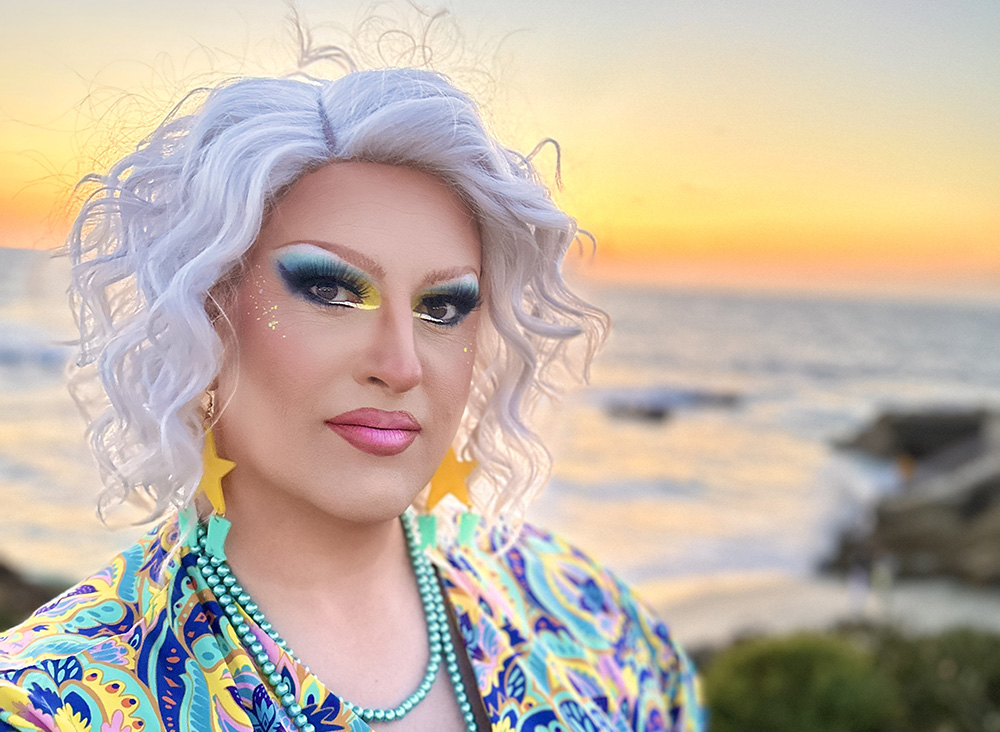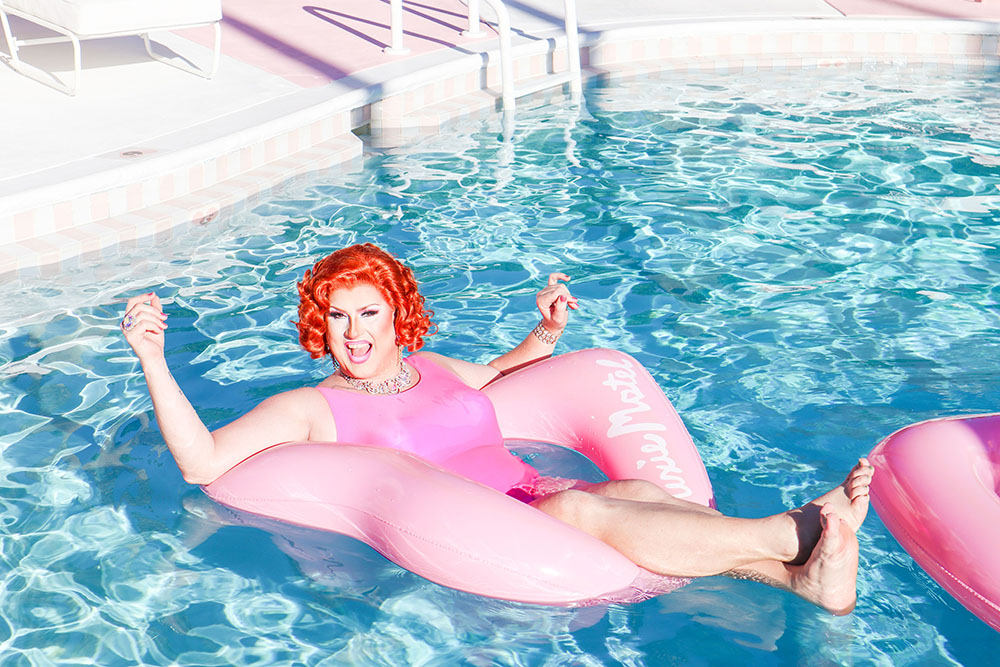
Flamy Grant in the photo shoot for the album "Bible Belt Baby" (Haley Hill)
I met Flamy Grant, a Christian drag queen musician who recently topped the Christian charts on iTunes for her No. 1 song "Good Day (feat. Derek Webb)" and No. 1 album "Bible Belt Baby," at the Folk Alliance International conference earlier this year. I was charmed by Flamy's warmth, kindness and humor, and enamored with her voice and songwriting. Flamy's music empowers listeners to deconstruct harmful elements of religion and stand in their truest selves in the love of a God who accepts them as they are — all while adding some tongue-in-cheek humor, adorned in full drag.
Flamy's album "Bible Belt Baby" released in October 2022. The album had not had large exposure until Christian nationalist preacher Sean Feucht, who infamously gathered large groups of unmasked people to worship together during the height of the COVID-19 pandemic, launched Flamy and her collaborator Derek Webb into the media spotlight through a Twitter exchange. Feucht tweeted that Flamy's presence in Christian music was a sign of "the last days," taunting that hardly anyone listens anyway.
In response to his comments, Flamy called on her fans to challenge the notion that no one listens. Subsequently, both the song and album each climbed their way to the #1 spot on the iTunes charts within 24 hours — making her the first drag queen to top the Christian charts.
I sat down to interview Flamy (whose given name is Matthew) about the recent unexpected media spotlight, the story behind writing the album "Bible Belt Baby" and how they navigate their identity as a queer drag performer who still identifies as a Christian.
Jessica: I thought it would be good to open with a "Drag 101" for Catholics and Christians who may not know much about drag culture. What is a drag queen?
Flamy/Matthew: Drag is an ancient art form. It was happening in Shakespeare. William Dorsey Swann (born in 1860) was the first to self-identify as a drag queen. Drag is performance art, like theater, and it can incorporate comedy, lip sync, dance, fashion, the artistry of what you do with body and face, creating an elevated, enhanced and exaggerated look.

Flamy Grant performs on stage. (Courtesy of Flamy Grant)
Flamy is distinct. She's an act. She's an extension of me, but she's an act. Matthew the they/them nonbinary human, that's how I walk around in the world.
Drag is playing and toying with the concept of gender, because we have this binary structure in American society that there are men and there are women and there are roles for each of them. The gender binary doesn't serve all of us, and some of us need to exist outside of that. That's one of the purposes of drag; the other is to entertain.
It really flourished in queer community because we didn't have spaces to perform, and we had to hide our relationships and identities because we were shamed for being ourselves. So it developed in secrecy, and that's why it has such a stigma.
What messaging did you receive growing up in your church about queerness, drag queens, etc.?
I didn't receive any messaging. Drag wasn't on the radar of anyone at my church. I grew up at a Plymouth Brethren fundamentalist evangelical church in Appalachia. I don't have distinct memories about anyone calling out gay and lesbian people until high school, but from an early age, cultural gender stereotypes were enforced.
I have pictures of myself running around in my mom's clothing and I got in trouble for breaking one of her tubes of lipstick. For me those behaviors were innate and instinctual, a kid being a kid. I certainly wasn't being groomed to do that. I got groomed to fulfill more masculine stereotypes.
The pressure to stay and conform was enforced by fear. If you leave, "hell's gonna getcha." That's why it took me 30 years to start exploring drag and my gender identity.
'If I can move the needle, I hope to help people navigate their fear around queerness.'
—Flamy Grant
How did you overcome that messaging to reach a place where you could step more fully into yourself, while also maintaining a relationship with your faith identity?
I wouldn't say there was one pivotal moment; it was long and drawn out. When I came out to my college best friend, I couldn't even say, "I'm gay" or "I struggle with same-sex attraction," I just pointed to Romans 1 then ran across the room and bawled. At 19, I saw myself as same-sex attracted and struggling, and I was trying to change because I thought that's what God wanted and what was required to stay in my church community.
I enrolled in Exodus, the world's largest conversion therapy program globally, where they'd send "problematic" queer congregants to try to change them straight. I spent five years there wondering, "How long will this take? How long til I'm straight?"
After five years, I accepted I couldn't change my orientation, but I was still not ready to say being gay is OK with God. I wanted to continue the conversation in my church community. But it was never talked about so I decided, I have to leave the church, there's not a place for me here.

Flamy Grant (Courtesy of Flamy Grant)
Eventually, I got involved with an LGBTQ-inclusive, affirming church and served there for eight and a half years as a worship leader.
Did "Bible Belt Baby" start out as a concept album or did it come together because of a common thread in the songs you were writing?
I was starting to see potential for Flamy as a musician, to meld my drag art and my music. During the pandemic lockdown, I went to my roommate Ben Grace of "Story & Tune" with the idea of making a drag record about recovery from religious trauma.
I launched a Kickstarer that raised over $10,000 so we could do a whole record. I dug back through my repertoire to find songs to add, that were probably Flamy songs all along. Before we knew it we had 10 songs.
The concept became overcoming shame from religious trauma, and that developed in tandem with the community I was building online.

Flamy Grant (Courtesy of Flamy Grant)
In "Esther, Ruth, and Rahab" , [you sing] "we see our paths by someone else's shine." How do you hope to see your shine help others find their own paths? Who is this song for?
It's for queer people. Particularly those who came from traumatic religious upbringing. It's for those who are navigating other people's fear of us or about us. If I can move the needle, I hope to help people navigate their fear around queerness. It's not my responsibility, but I'm well-suited to do it without internalizing consequences, now after therapy and healing.
The song is for queer kids growing up in church, to know and see that they have options. Even if their church or parents are grooming them to conform, if they can see that there is a Christian drag queen, I feel like that would have given me hope as a kid.
Additionally, it's inspired by my sibling's own gender journey. And of course it's for all women. It's a feminist anthem.
You covered Amy Grant's "Takes A Little Time" on the record. What made you fall in love with her music and inspired you to choose your drag queen name?
I wasn't allowed to listen to anything I couldn't buy in a Christian music store. Amy Grant was the diva of my world. I genuinely love her music.
Her "Behind the Eyes" record is my favorite because it got dark and brooding. Her music gets emotional, and it was the first time I heard a song without a resolution. Christian music always resolves with a little bow. But hers was unresolved.
I chose to cover "Takes A Little Time" because it fits the theme of my journey on the record, and it added new meaning to perform it with Semler, the two of us queer Christian artists, slowing it down, making it contemplative.
And Flamy Grant just came to me. I liked word play in some of my favorite fellow drag queens' names. Amy Grant was my idol and Flamy Grant just fit me.
Your song "Holy Ground" seems like a song about giving up, letting go of life on earth, though the earthiness of the lyrics makes me think of the words of Psalm 139 "made in the depths of earth." Like a death into life. What does this song mean to you?
It's my favorite song on the record. I love the different interpretations of it. I wanted to make it a place where people can sit and feel for an almost uncomfortable amount of time. I intentionally chose its place on the album to be transitional between sides A and B. I appreciate that comparison of death and birth both being dark places.
"Desire of Your Heart" is a poignant love song. It sounds like the "you" is a lover, another friend who has been through what you have, your younger self, also God?
It's a love letter to my inner kid who was so heavily shamed that drag went into the closet for 30 years. Flamy is singing that song to little Matthew. The "years we spent apart" lyric was like "You don't know I exist, but I'm there."
Finally, your worship song "Good Day" just topped the charts! Will you share the story behind this song?
This song has new meaning because it charted as #1 Christian song. Hearing that my lyrics "So I'm here to stay and I'm sitting in the front row, 'Cause it's a good day to come out of the shadow" are No. 1 is making me weep.
The song came to me when I was ministering as a worship leader at an affirming church, but I didn't want to use the word Christian to describe myself. I was grumpy. I got dragged to a queer small group at my church and the icebreaker question was: "How do you reconcile your faith and sexuality?"
Advertisement
I responded "I don't! I don't call myself Christian anymore, there's nothing to reconcile."
Then everybody else shared stories, and there was a common thread among them: They stay because there are other queer kids in church and they want them to have someone to look up to. After hearing all those shares, I felt convicted, humbled and small.
I went home and the song just poured out of me. We sang it at my church the next week. It's a song for the people who stay. I'm not advocating that everyone stay. Some folks need to get out and live their best life outside of a church. It's not our obligation as queer people to stay. But it does make a difference.








